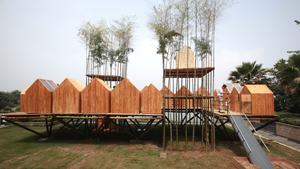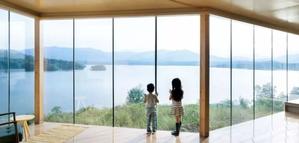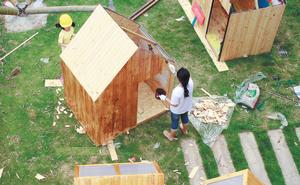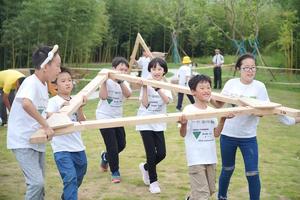Architect takes a walk on the wild side to set up homes in Wuhan's outdoors, Yang Feiyue reports.
 More than 30 families establish their homes by Wuhan's Tangxun Lake during Mu's first project in 2013. (PHOTO PROVIDED TO CHINA DAILY)
More than 30 families establish their homes by Wuhan's Tangxun Lake during Mu's first project in 2013. (PHOTO PROVIDED TO CHINA DAILY)
An island getaway, a home in the country, your own private paradise, is a dream too far for most people. But architect Mu Wei has laid the foundations, literally, for such a dream for his family and himself on an island on the outskirts of Wuhan, Central China's Hubei province.
"Everything was dreamy here when I first saw it, with weeds, a tree and a vast spread of water," says Mu, 38, who was born and bred in North China's Hebei province.
The island covers an area of 20 hectares and was rented by a friend of Mu's more than a decade ago, mainly for sustainable agriculture development.
Nature is a very important destination for us, so it should be an integral part of architecture
Mu Wei, architect
"It was great to find a place like this near the city to allow my children and myself to escape from urban life for a change," he says.
Mu began to build houses on the island with some of his friends in 2017. The whole project took a year, and now four houses, each with particular features, stand testament to his vision.
Mu's own house covers an area of 60 square meters and resembles a big "X".
"It was built of logs and bolts, at low cost, and blends into the natural landscape," he says.
The house was built to have a life span of at least 40 years. Mu explains that usually the land lease can be renewed after the old one expires.
 Architect Mu Wei built close-to-nature houses on an island on the outskirts of Wuhan along with some of his friends in 2017. (PHOTO PROVIDED TO CHINA DAILY)
Architect Mu Wei built close-to-nature houses on an island on the outskirts of Wuhan along with some of his friends in 2017. (PHOTO PROVIDED TO CHINA DAILY)
Because of the shape of Mu's house, the many corners present a different vista of the water-and-mountain scenes. The glass frontage gives the house a reflective mirror-like quality so you see the surroundings even with your back turned to them as you approach the building.
"I tried to make it as something that's one with nature," Mu says.
The idea is to let the house blend into its surroundings. One surprising feature is that the house doesn't have designated bedrooms which means the multipurpose rooms can be adapted at a moment's notice.
"My children can roll around on the floor, barefoot," Mu says.
The weekend hideaway, with plentiful fishing on offer, rabbits frolicking and pheasants dropping in, is just 90 minutes from downtown.
Mu says he wanted his 7-year-old daughter and 5-year-old son to sample the wonders of nature up close and personal.
 Families work on new houses by the Tangxun Lake in Wuhan, Hubei province, in 2013. (PHOTO PROVIDED TO CHINA DAILY)
Families work on new houses by the Tangxun Lake in Wuhan, Hubei province, in 2013. (PHOTO PROVIDED TO CHINA DAILY)
Mu first considered a country life in 2005, the last year of his architecture studies at Huazhong University of Science and Technology in Wuhan. He joined a program hosted by celebrated Taiwan architect Hsieh Ying-chun, along with more than 40 architecture students, to build cheap housing for the disadvantaged.
Mu worked with other volunteers to carry steel joists, reinforcement bars and bags of cement for the project in rural Hebei.
The experience provided a valuable lesson in how to turn abstract ideas into brick-and-mortar buildings. He realized the beauty of working the soil for the foundation and turning architectural drawings into something, well, concrete.
"It suddenly dawned on me what architecture is and what architecture I want to do," Mu says.
After graduation, Mu went to work at architectural firms in Spain and Norway to enhance his talent and to gain valuable experience in cultures different from his own. The European experience gave him a taste of nature.
 Youngsters team up to construct houses in the Wiki Tribe theme park in Huzhou, Zhejiang province. (PHOTO PROVIDED TO CHINA DAILY)
Youngsters team up to construct houses in the Wiki Tribe theme park in Huzhou, Zhejiang province. (PHOTO PROVIDED TO CHINA DAILY)
He enjoyed living in a wood cabin, nestled by the sea, in Norway. "Seagulls flapped around before my window, waking me up every morning."
He also got insights into human interaction with nature from an unlikely source.
"All Norwegian kindergartens, even in the depths of winter, have their lunch break outdoors," Mu says. "They value the formative powers of the natural environment, and do not fear the cold or heat."
He was particularly impressed by how children under 5 years of age would sleep next to one another in the fields in freezing weather. He also admired how the children were taken on long hikes in the forest and learned how to set up tents, light fires and make furniture out of branches. It also reminded him of the beauty of his own childhood, when he enjoyed hunting with his father and diving into the sea.
He returned to China in 2010 and was determined that nature would play a role in his career.
In 2013, Mu launched his first project at Wuhan's Tangxun Lake, where more than 30 families have since established homes.
Mu drew sketches, made models and discussed possible plans with them, and then called up parents to actually help construct the homes.
 Mu Wei, architect. (PHOTO PROVIDED TO CHINA DAILY)
Mu Wei, architect. (PHOTO PROVIDED TO CHINA DAILY)
Children got to learn about architecture while giving free rein to their imagination in the process, and parents realized the benefits of hard labor, Mu says.
"We found more parents, especially fathers who wanted to get involved and bond with their children."
Mu launched similar programs over the years. He showed people how to build houses with ropes in forests near Wuhan and held art camps for children during a Sino-French architectural festival.
Mu's activities have attracted increasing attention and admiration and he then got the opportunity to build a theme park, Wiki Tribe, with Sunac China and other institutions. The purpose of the project in Zhejiang province's Huzhou is to allow children and parents from the city and countryside to design and build public buildings.
Mu believes his appreciation of the benefits of nature is making inroads.
"Nature is a very important destination for us, so it should be an integral part of architecture," Mu adds.
He says he hopes his practice can help return architecture from machines to everyone's own bare hands again.
Contact the writer at yangfeiyue@chinadaily.com.cn


